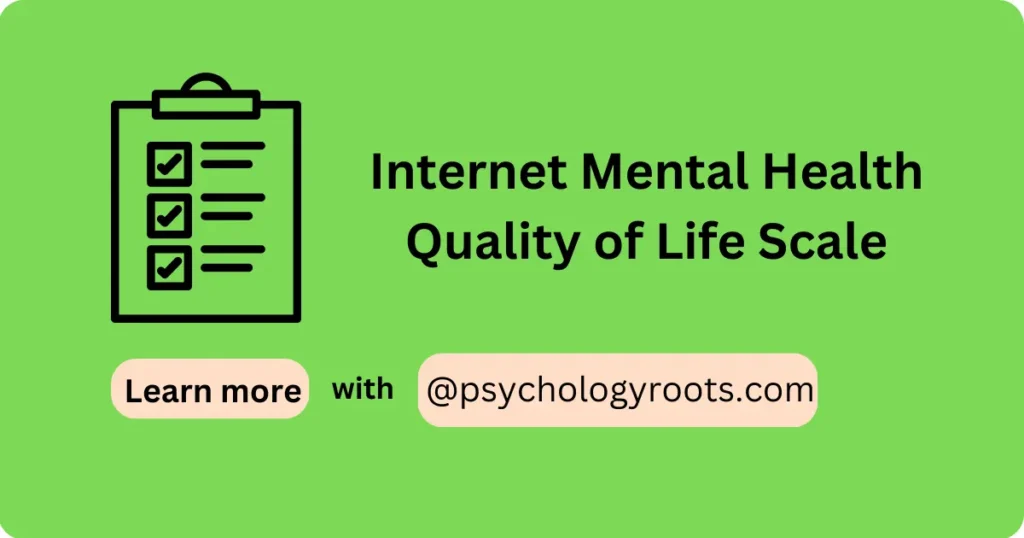Table of Contents
Internet Mental Health Quality of Life Scale
Here in this post, we are sharing the “Internet Mental Health Quality of Life Scale”. You can read psychometric and Author information. We have thousands of Scales and questionnaires in our collection (See Scales and Questionnaires). You can demand us any scale and questionnaires related to psychology through our community, and we will provide you with a short time. Keep visiting Psychology Roots.
About Internet Mental Health Quality of Life Scale
Scale Name
Internet Mental Health Quality of Life Scale
Author Details
Phillip W. Long
Translation Availability
Not Sure

Background/Description
Developed by Phillip W. Long, the Internet Mental Health Quality of Life Scale (IMHS) is a valuable tool for assessing the impact of online mental health resources on an individual’s well-being. Originally published in 2006, it contains 78 self-reported items divided into four key subscales:
- Psychological well-being: This evaluates emotional state, depression, anxiety, and overall mental health.
- Social well-being: This assesses satisfaction with social relationships, support networks, and social activities.
- Functional well-being: This gauges the ability to perform daily tasks, work, and manage responsibilities.
- Spiritual well-being: This explores sense of purpose, meaning in life, and connection to spirituality or religion.
Each item is rated on a Likert scale, and scores are summed for each subscale and the overall questionnaire. Higher scores indicate a better quality of life and well-being.
The IMHS serves various purposes:
- Research: It helps researchers evaluate the effectiveness of online mental health interventions in improving quality of life.
- Clinical practice: Clinicians can use it to monitor progress and outcomes for individuals using online therapy or support groups.
- Self-monitoring: Individuals can track their own progress and well-being while engaging with online mental health resources.
However, it’s important to remember that the IMHS is a self-report measure and not a diagnostic tool. While it provides valuable insights, it shouldn’t be used for formal diagnosis or treatment decisions.
Administration, Scoring and Interpretation
- Instructions: Ensure clear and concise instructions are provided, explaining the purpose of the questionnaire and how to answer the questions.
- Privacy: Maintain participant confidentiality and anonymity, especially if administered in group settings.
- Response options: Each item is typically rated on a Likert scale (e.g., 0-4), ensuring participants understand the response options.
- Completion time: The IMHS typically takes around 15-20 minutes to complete, but individual variations may occur.
- Scoring: Scoring instructions are available with the questionnaire, allowing for calculation of individual and subscale scores.
Reliability and Validity
The IMHS developed by Phillip W. Long has been assessed for both its reliability and validity, demonstrating strong psychometric properties for measuring quality of life among users of online mental health resources.
Available Versions
78-Items
Reference
n/a
Important Link
Scale File:
Frequently Asked Questions
Q: What is the IMHS?
A: The IMHS is a questionnaire that measures well-being in people using online mental health resources. It helps understand how online interventions or support groups impact quality of life.
Q: How does it work?
A: You answer 78 questions about your emotional, social, functional, and spiritual well-being. Scores are then calculated to see how online resources affect your overall quality of life.
Q: Who uses the IMHS?
A: Researchers use it to study online mental health programs, clinicians use it to track client progress, and individuals can use it to monitor their own well-being while using online resources.
Q: Is it reliable and valid?
A: Yes, studies show it’s a reliable and accurate measure of online mental health-related quality of life.
Disclaimer
Please note that Psychology Roots does not have the right to grant permission for the use of any psychological scales or assessments listed on its website. To use any scale or assessment, you must obtain permission directly from the author or translator of the tool. Psychology Roots provides information about various tools and their administration procedures, but it is your responsibility to obtain proper permissions before using any scale or assessment. If you need further information about an author’s contact details, please submit a query to the Psychology Roots team.
Help Us Improve This Article
Have you discovered an inaccuracy? We put out great effort to give accurate and scientifically trustworthy information to our readers. Please notify us if you discover any typographical or grammatical errors.
Make a comment. We acknowledge and appreciate your efforts.
If you have any scale or any material related to psychology kindly share it with us at psychologyroots@gmail.com. We help others on behalf of you.